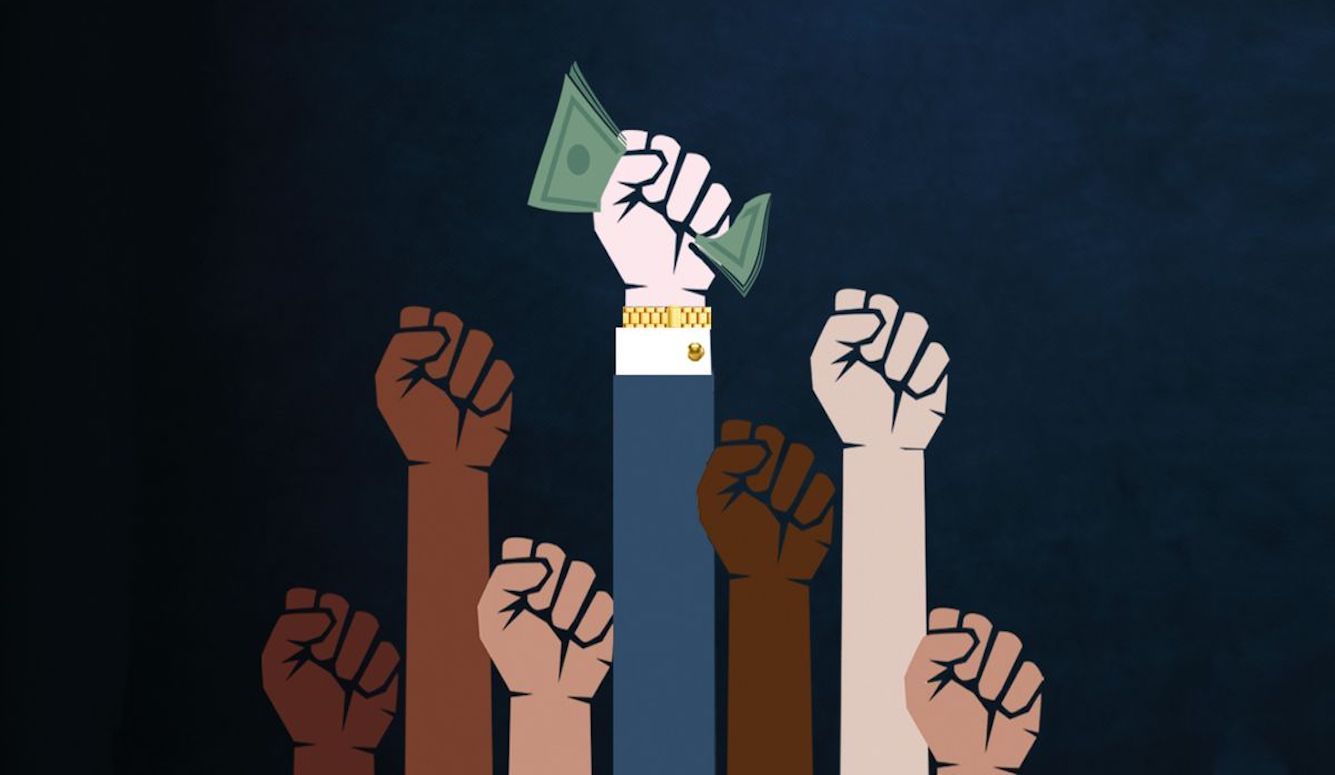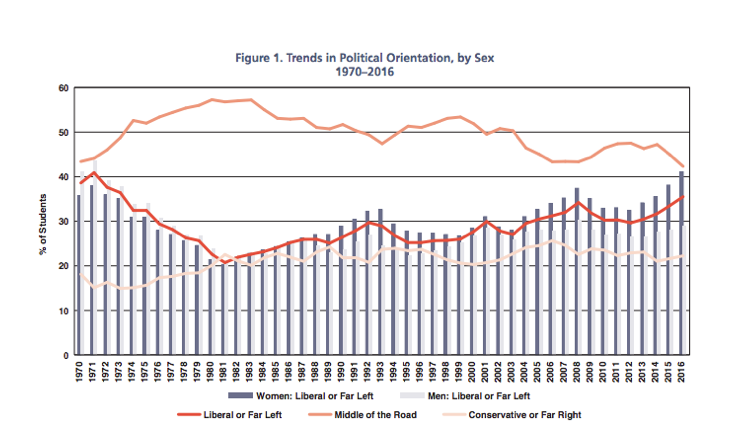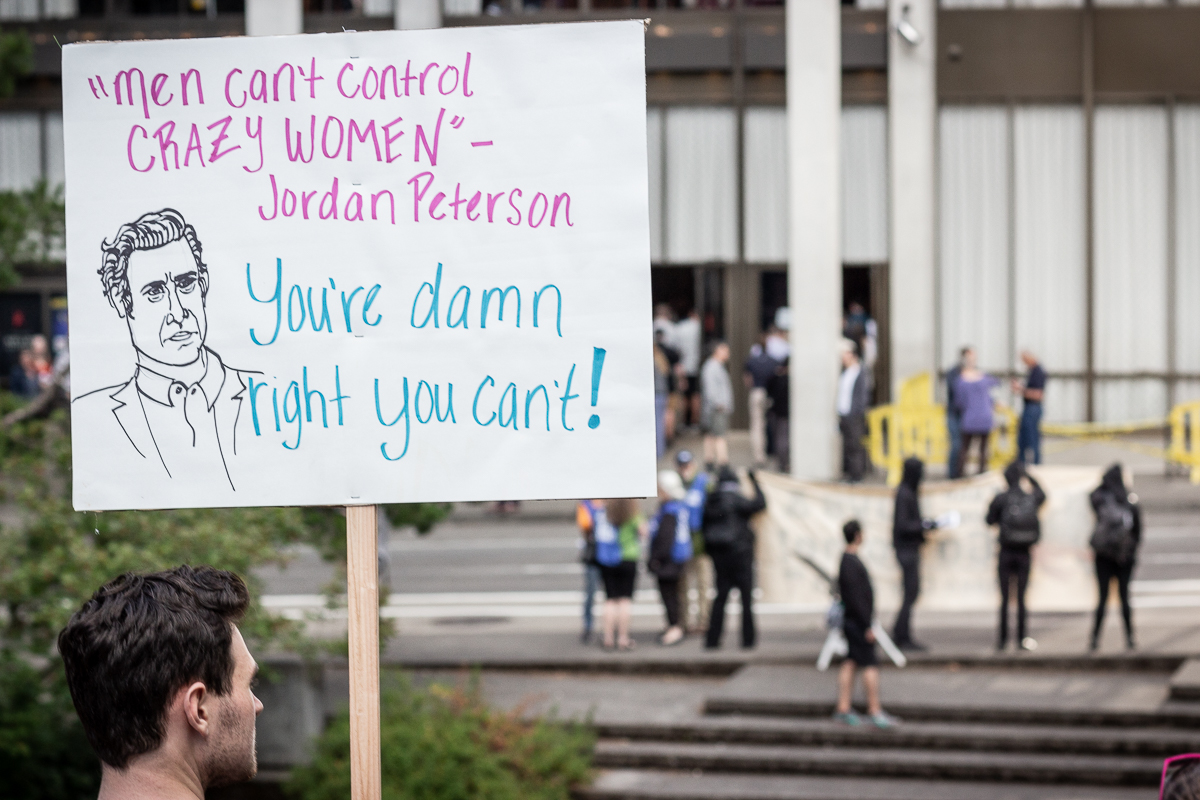corporations
Patreon Games
Progressives and corporations when aligned form a very powerful coalition, so when they combine to restrict speech or behavior they’re likely to be successful.

On December 6, crowdfunding service Patreon removed the account of popular YouTuber Carl Benjamin, who is better known by his YouTube moniker Sargon of Akkad. In a statement, Patreon explained that Benjamin was removed for exposing hate speech under its community guidelines, which prohibit: “serious attacks, or even negative generalizations, of people based on their race [and] sexual orientation.” The incident in question was an appearance on another YouTube channel where Benjamin used racial and homosexual slurs during an emotional outburst. (The outburst was transcribed and included for reference as part of Patreon’s statement.)
Patreon’s reaction sparked immediate accusations of political bias from many centrists and conservatives, as Benjamin—who identifies as a classical liberal—is a frequent and outspoken critic of contemporary progressivism, receiving hundreds of thousands of views on many of his videos. The fact that Benjamin was removed from Patreon for an outburst on another YouTube channel almost a year ago, when he produces hours of content every week on his own channels and appears regularly on many others, suggested that this was a targeted attempt to remove him due to his politics, either by Patreon employees themselves or as a response to outside pressure.
This belief was bolstered by the fact that Patreon’s CEO Jack Conte had appeared on popular YouTube talk show “The Rubin Report” last year to explain the removal of conservative YouTube personality Lauren Southern, where he seemed to suggest that Patreon’s content policy had three sections and that hate speech was in the first section, meaning that it only applied to content uploaded to Patreon’s own platform. (Southern was removed for off-platform activity because she had “crossed the line between speech and action,” Conte maintained, which he implied was covered by the more severe second and third sections of their content policy.)
There’s nothing unusual about a company revising its content policy, of course, but it seemed suspicious that Benjamin was being removed for a different set of rules than those Patreon’s CEO had previously articulated. In fact, several people pointed out the prevalence of similar slurs on Patreon’s own platform as further indication that Benjamin was specifically targeted for his political views.
The situation became even more confusing when Patreon’s Head of Trust and Safety Jacqueline Hart in a long conversation with YouTuber Matt Christiansen seemed to distinguish on multiple occasions between content posted on and off Patreon’s own platform. Similarly, in an interview with The New York Times, Hart said of Benjamin that: “You cannot say those words on our platform,” again seemingly conflating content posted on Patreon’s platform with off-platform content.
At minimum, this situation suggested that Patreon has now established guidelines that are so broad and vague that they could be applied to almost any situation, including non-funded activity. Given the current cultural climate, it’s not implausible that a social media post on the biological differences between men and women could be viewed as a negative generalization, thus making it hate speech and grounds for Patreon to terminate the person’s account. (Patreon’s definition of hate speech includes negative generalizations of people based on their race, ethnicity, national origin, religion, sex, gender, sexual orientation, age, disability or serious medical conditions.)
Facing this uncertainty, several prominent Patreon accountholders announced they would pursue alternative solutions. Sam Harris closed his account immediately and referred supporters to a subscription service through his website, while Jordan Peterson and Dave Rubin announced they were building their own crowdfunding platform, which Quillette said it would join. Peterson and Rubin later announced they were leaving Patreon on January 15.

While there are many interesting subplots to this story, it’s difficult not to notice the contrast between Conte’s attitude when he appeared on “The Rubin Report” and the direction Patreon has moved over the past year and a half since. It’s impossible to know for sure how sincere someone is, of course, but it certainly seemed to me that Conte, who is also a musician and songwriter, embodied a kind of live-and-let-live attitude that he wanted Patreon to adopt. He spoke enthusiastically to Rubin about his desire to free content creators from the constraints of advertisers being the arbiters of acceptable content.
Yet, ironically, Patreon has now essentially taken on the role of content arbiter. Hart suggested to Christiansen during their discussion that if he had any questions, “about something you might be saying, is that you can always contact us,” and that, “one of the things that we do with creators is if they say, hey, I’m about to go and do this thing, we say don’t link that to Patreon, or don’t say this or this.”
In fact, Patreon has gone even further down this path than advertisers. Hart mentioned in her Times interview that after a breach in their policy, Patreon requests a public apology from the offender where: “Patreon has to decide what qualifies as a sincere and thorough apology.” She further noted that: “We hand-hold creators, and we work with them one on one, and nearly every creator reforms—and so it’s quite a successful process.” She said of Benjamin that he, “did not respond to attempts to engage him in the reform process.”
It strikes me as exceedingly unlikely that Conte has been driving these changes, given his previous attitude. And Hart, speaking off-the-cuff during the Christiansen discussion, seemed to be stuck between a rock and a hard place. Most likely, the changes have been forced upon Patreon from outside the company.
Interestingly, it seems these pressures aren’t just coming from one side, but from two. Hart, during her discussion with Christiansen, mentioned both Patreon’s need to satisfy its other accountholders, who might not want to be associated with Benjamin’s words, as well as the payment processors Patreon works with. (Confirming the second part, a tweet from Patreon to controversial Islam-critic Robert Spencer a few months ago declared that it had removed his account at Mastercard’s request.)
This reflects what seems at first glance like an odd dynamic, in which predominantly progressive people combine with large corporations to pressure their partners into restricting speech and behavior. In this sense, Patreon’s case strikes me as emblematic of a broader development in the technology industry, where idealistic founders and early adopters wanting to liberate people from restrictive structures have found themselves pressured to enforce restrictions of their own.
But how do we explain this strange alliance between progressives—including progressive activists and organizations—and corporations? These two groups seem naturally opposed, but that isn’t nearly as much the case as it used to be. The reason, I would argue, is that there has been a realignment among both groups that makes their interests far more aligned than they used to be.

* * *
In 2015, psychologist Jonathan Haidt and lawyer Greg Lukianoff wrote an article in The Atlantic titled: “The Coddling of the American Mind,” describing an emerging culture on university campuses focussed on preventing discomfort amongst students, achieved in part by describing it as harm or violence. This phenomenon has continued to develop and has spread to universities in other countries, and Haidt and Lukianoff recently published a book with the same title expanding on their observations.
While this phenomenon clearly extends beyond political ideology—Haidt and Lukianoff attribute it first and foremost to overprotective parenting and the rise of social media, although they mention other factors as well—it does intersect with it in interesting ways. The phenomenon is most apparent at universities where progressive views are dominant, suggesting there is a link, and it’s usually especially focussed on protecting marginalized groups.
So, it would be wrong to say that this emerging safety culture has replaced progressivism. Rather, it seems to have reframed it. If we define progressivism roughly as a movement focussed on the desire to minimize domination, then this aspect has clearly been preserved. What does seem different relative to traditional versions of progressivism, though, is that it’s less prone to describing domination as oppressive and restrictive, and more prone to describing it as harmful and violent. Consequently, it tends to frame its goals in terms of safety and harm-prevention, rather than in terms of freedom.
This might seem like nitpicking, but it does make a difference. And this is not something that is restricted to universities. Consider the following recent case:
A billboard advert for an over-fifties dating app featuring a topless man with the tagline, “Pull a cracker this Christmas,” was rejected by Transport for London’s advertising agent, Exterion Media, on the grounds that it wasn’t compliant with Committee of Advertising Practice guidelines, demanding that the advert feature a clothed model and a less suggestive tagline. Exterion claimed that the advert could be seen as objectifying the man and his physique, and in emails also rejected the advert on the basis of social responsibility and potential offense. Lately, it has been cracking down on adverts deemed to be body-shaming.
This follows in the wake of a decision by Britain’s Advertising Standards Authority to enforce a new code from June 2019 so that: “British companies will no longer be able to create promotions that depict men and women engaged in gender-stereotypical activities, amid fears that such depictions are contributing to pay inequality and causing psychological harm.” Also, “adverts that suggest that transforming your body will make you romantically successful,” will be banned. It also clarified “rules on the sexualisation of young women.”
It’s obvious from the use of terminology that these changes have been heavily influenced by the kind of safety culture Haidt and Lukianoff refer to, although it’s not something that’s easily attributed to overprotective parenting. A better explanation here seems to be the influence of feminist ideas and discourse in relation to beauty and fitness norms, gender stereotypes, and sexuality.
More broadly, though, it’s not unreasonable to think that the influence of feminist ideas has helped cause the reframing of progressivism from an emphasis on freedom towards an emphasis on safety and harm-prevention, and that this isn’t just limited to the specific issues mentioned above, but represents a general shift in attitude that includes less tolerance of offensive speech, for example.
And there does seem to be a gender-component to this. An ongoing surveyof the political orientation of incoming American university students dating back several decades shows an eye-opening trend. During the early 1970s, men were more likely to be on the political left than women. That gradually reversed during the late 1970s and 1980s, and the gap has been growing. Today, women are substantially more likely than men to be on the political left among incoming university students.

Women are traditionally more conservative than men, but modern progressivism seems to have gradually developed into a movement that is extremely appealing to women, especially younger, more secular women. And part of the reason for this, perhaps, is that it has shifted away from the freedom-oriented attitude of the 1970s and towards safety and rigid norms. It has essentially adopted values traditionally associated with conservatism, thus making it something of a hybrid. (This refers to mainstream progressivism, not the radical fringe.)
But this seems to have produced a counter-reaction of predominantly young men who find themselves unable to identify with this version of progressivism. So, almost by default they find themselves on the political right, aligned with conservatives with whom they have almost nothing in common.
* * *
What’s interesting about this new version of progressivism is that it’s much more palatable to corporations. While there’s a common belief that corporations are focussed on “making a profit,” this is an oversimplification. What corporations are most concerned with is growth; especially stable and predictable growth. For example, Apple, the world’s most valuable company just three months ago, has lost almost 40 percent of its market capitalizationsince then. This wasn’t due to a massive drop in profitability, but rather because of uncertainty related to its future revenue potential, especially in China, as well as because of general economic uncertainty. When corporations downgrade their revenue forecasts even slightly, they’re usually punished by investors.
So, corporations are interested in fostering a stable environment that minimizes risk and which provides a platform for predictable long-term growth. And in this regard, progressives that want to restrict offensive speech and regulate behavior to ensure safety and minimize the risk of harm can actually be quite beneficial. Certainly, they pose less of a problem than more disruptive old-fashioned progressives.
And this is especially true when taking into account a second shift in progressivism over the past few decades: a de-emphasis of class- and labor issues in favor of an emphasis on other forms of identity, especially race, gender, and sexuality. Not only does this reduce the pressure progressives have traditionally placed on corporations, but it also supports the increased emphasis most corporations place on growth and talent-acquisition.
If one were to design the perfect employee for these corporations, it would be hard to do better than one that was cosmopolitan and desexualized, while also being exquisitely sensitive to offense and harm.
And, of course, there has also been a shift in the corporate world which makes this even more relevant. Industrial companies have become less and less important, and technology companies more and more important. Of the world’s six most valuable companies, five are technology companies: Microsoft, Apple, Amazon, Alphabet (Google’s parent company), and Facebook. All of these companies operate in sensitive international environments and recruit from all around the world.
Now, it would be an exaggeration to say that contemporary mainstream progressives never are at odds with corporations, clearly they sometimes are. But their interests are far more aligned than they were in the past, and even when in conflict, they’re easier to placate. Witness the many social justice projects that corporations undertake in cooperation with progressive organizations. While they aren’t free, they’re more manageable than facing serious disruption, and they create co-operation and goodwill.
The point is that one shouldn’t be surprised by the fact that companies like Patreon face surprisingly similar pressures from both progressives and corporations—their concerns are in many respects more similar than they might initially seem.
* * *
So, what’s the problem—if progressives and corporations find their interests more aligned than previously, and are able to co-operate to achieve shared goals, surely this is beneficial to everyone?
Progressives and corporations when aligned form a very powerful coalition, so when they combine to restrict speech or behavior they’re likely to be successful. As technology continues to develop, it will become easier and easier in practice. This is especially true when both groups also formulate these restrictions in co-operation with governments and other organizations, as they sometimes do.
This seems like something progressives should be concerned about, but as their goals have shifted from freedom to safety this can no longer be taken for granted. The problem, of course, is that it’s possible in principle to have a society that is entirely safe and entirely without domination, as long as one is willing to give up freedom. Why? Because control can be offloaded to an impersonal system.

And this is the risk: Corporations, whether it be tech companies like Google or payment companies like Mastercard, develop increasingly advanced technology to monitor, regulate, and influence speech and behavior. Contemporary progressives, meanwhile, are happily on board because it ensures an unoffensive and safe environment while also eliminating domination (as it’s all automated). This, to me, is dystopian, although if someone is genuinely willing to give up freedom for safety it’s difficult to argue against it.
And, of course, this assumes things go right. It’s also possible that this amount of control could be abused and could be used to cause harm rather than prevent it.
This is definitely something to be aware of.






